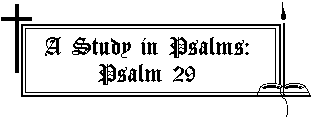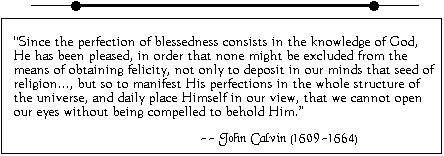

1Ascribe to the LORD, O mighty ones,
ascribe to the LORD glory and strength.
2Ascribe to the LORD the glory due to His name;
worship the LORD in the splendor of His holiness.
3The voice of the LORD is over the waters;
the God of glory thunders,
the LORD thunders over the mighty waters.
4The voice of the LORD is powerful;
the voice of the LORD is majestic.
5The voice of the LORD breaks the cedars;
the LORD breaks in pieces the cedars of Lebanon.
6He makes Lebanon skip like a calf,
Sirion like a young wild ox.
7The voice of the LORD strikes
with flashes of lightning.
8The voice of the LORD shakes the desert;
the LORD shakes the Desert of Kadesh.
9The voice of the LORD twists the oaks
and strips the forests bare.
And in His temple all cry, "Glory!"
10The LORD sits enthroned over the flood;
the LORD is enthroned as King forever.
11The LORD gives strength to His people;
the LORD blesses His people with peace.
David as a young man, being a shepherd as well as poet, spent a lot of time outdoors in the midst of his Lord's creation. Also, later in life, he spent much time in the wilderness, fleeing from his enemies (Saul and Absalom), and then in battle against the Philistines. So, it is not surprising that many of David's psalms seem to have been inspired by his first-hand witnessing of God's work through His creation. In Psalm 8, David considers the heavens, the "works of [God's] hands"; in Psalm 19, David writes: "The heavens declare the glory of God; the skies proclaim the work of His hand"; here in Psalm 29, David meditates upon God with the help of a magnificent thunderstorm.
The earth, the laws of science and nature, the heavenly bodies, were all created by God; and so, we can learn much about God through the study of them. Scientists, those who study God's creation and the laws of science that He created, have no excuse not to know God. They see first-hand evidence of the existence and intelligence of God through the exquisite design of the universe and its natural laws. "An undevout astronomer is mad. . . God is everywhere. His wonders are everywhere. All but the blind or perverse see and worship"[Footnote #6]
1Ascribe to the LORD, O mighty ones,
ascribe to the LORD glory and strength.
2Ascribe to the LORD the glory due to His name;
worship the LORD in the splendor of His holiness.
By way of introduction, David exhorts: "Ascribe to the LORD, O mighty ones, ascribe to the LORD glory and strength. Ascribe to the LORD the glory due to His name." As we look upon the glory of the creation and the power of natural phenomena, we must "ascribe to the LORD glory and strength", for it is He who created the heavens and the earth, and who sustains them. It is through His power that the mighty glaciers carve out valleys, that the waves crash on the shore, that the earth moves, that the fierce winds of the hurricane blow. It is an abomination to ascribe to a mythical "Mother Nature" the magnificent natural phenomena. God created the heavens and the earth. "Ascribe to the LORD glory and strength."
David is speaking specifically to the "mighty ones", or literally, the "sons of the mighty". There are differing views as to who the "sons of the mighty" are. Some think David is speaking of the angels (as in Job 38:7); some think David is referring to powerful leaders on earth (as in Ps. 82:6). I think that the latter is more in keeping with the context. The powerful of the earth--the princes, kings, presidents, magnates--need greatly to be reminded to "ascribe to the LORD the glory due to His name". No creature is too mighty so as not to be obliged to fall prostrate on the ground and worship the Lord. "Of all men princes should be most careful to glorify God, and yet it is most rare to see them humble themselves before Him: for natural corruption is as strong in them as in others: their education breedeth them to high and stately thoughts of themselves, their riches and power puff them up, and flatterers, ordinarily following them, make them forget themselves and God also."[Footnote #7]
The great sin of the "mighty ones" on earth is to ignore God, to fail to give Him glory. It is they who are the most blessed in this world that have all the more obligation to worship God, for "every good and perfect gift is from above, coming down from the Father of heavenly lights" (James 1:17). As Christ taught: "From everyone who has been given much, much will be demanded; and from the one who has been entrusted with much, much more will be asked" (Luke 12:48).
Naturally following the ascription to the Lord of glory and strength, is the worship of the Lord. So David continues: "Worship the LORD in the splendor of His holiness" (vs. 2). Realization that the Lord created the heavens and the earth, and that through His power He sustains them, must lead to worship of Him. If He created us, then He deserves our allegiance. Our Creator and Sustainer deserves our complete obedience. We all fall short in this, but we must do our best, and "worship the LORD in the splendor of His holiness."
3The voice of the LORD is over the waters;
the God of glory thunders,
the LORD thunders over the mighty waters.
4The voice of the LORD is powerful;
the voice of the LORD is majestic.
5The voice of the LORD breaks the cedars;
the LORD breaks in pieces the cedars of Lebanon.
6He makes Lebanon skip like a calf,
Sirion like a young wild ox.
7The voice of the LORD strikes
with flashes of lightning.
8The voice of the LORD shakes the desert;
the LORD shakes the Desert of Kadesh.
9The voice of the LORD twists the oaks
and strips the forests bare.
And in His temple all cry, "Glory!"
10The LORD sits enthroned over the flood;
the LORD is enthroned as King forever.
11The LORD gives strength to His people;
the LORD blesses His people with peace.
Imagine David, sitting in a tent in the wilderness, listening to a storm approaching, hearing the voice of God in it: "The voice of the LORD is over the waters; the God of glory thunders, the LORD thunders over the mighty waters" (vs. 3). We in our stuccoed houses are too far removed from the power of God in nature to fully appreciate Him. David surely felt this storm to his bones as the thunder shook and the lightning flashed.
David describes the storm from the point of view of a man who is conscious of God, a man who knows that God is the power behind the storm. There is no power in the storm outside of God. The power of nature is God; the thunderous voice of the storm is the "voice of the LORD". We should listen to the voice of nature as if it were the voice of God speaking to us in power. His creation speaks loudly to us of Him. The powerful voice of the storm speaks of the power of God: "The voice of the LORD is powerful; the voice of the LORD is majestic." (vs. 4). His voice is so powerful that His voice alone can "break the cedars." (vs. 5). This should not surprise us. His voice said, "Let there be light" and there was light. His voice breaks not just any cedars, but it "breaks in pieces the cedars of Lebanon" (vs. 5). The stately "cedars of Lebanon" were a symbol at that time of the indestructible and the proud. So, symbolically here, the voice of the Lord is bringing down the indestructible (demonstrating His undefeatable power), and laying low the proud (demonstrating that all must worship Him).
The voice of the Lord not only breaks cedars, but moves mountains: "He makes Lebanon skip like a calf, Sirion[Footnote #8] like a young wild ox." (vs. 6). The deserts and forests also feel the power of His voice: "The voice of the LORD shakes the desert; the LORD shakes the Desert of Kadesh. The voice of the LORD twists the oaks and strips the forests bare" (vs. 8,9). No part of His creation can escape the power of His voice. And "if His voice be this mighty, what must His hand be!"[Footnote #9] If thunder here and now is scary, what of the day of God's wrath. On that day, the enemies of God will call "to the mountains and the rocks, `Fall on us and hide us from the face of Him who sits on the throne and from the wrath of the Lamb!'" (Rev. 6:16).
But for us "in His temple", we can peer through the door of the tent with David, see the brilliant flashes of lightning, hear the majestic voice of thunder, witness the mountains being moved, the cedars crumbling, the oaks twisting--I say, we can sit with David in the temple of the Lord and, with David, "cry `Glory!'" The people of God need not fear the powerful voice of the Lord. On the contrary, the people of God can see His power and take comfort that He is their God. The power of God is behind His people, not against them. Seeing His power makes us not fear, but rather, cry "Glory!" As David puts it: "The LORD gives strength to His people; the LORD blesses His people with peace" (vs. 11). For the people of God, the recurring thunderstorms, the recurring evidences of God's power in nature, show that the "LORD is enthroned as King forever" (vs. 10).
Father, we praise You for Your power, displayed so mightily in nature. May we glorify You, as we ascribe all glory and strength to You. We praise You that You, our Lord, are all-powerful. We praise You that You show Your power to us in nature, so that we have evidence of Your power, and so that we can be comforted that our Lord is greater than all things. We pray these things in the name of Your Son, Jesus Christ, Amen.

Footnotes:
6. William Plumer, Studies in the Book of Psalms, pg. 373.
7. David Dickson, Commentary on the Psalms, pg. 149.
8. "Sirion" is the Sidonian name for Mount Hermon.
9. Charles Spurgeon, A Treasury of David, Vol. II, pg. 31.